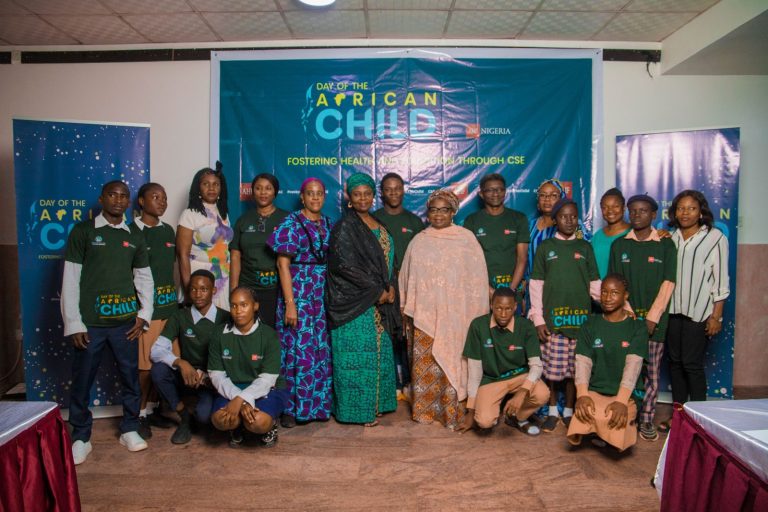The AIDS Healthcare Foundation(AHF) has called for Comprehensive Sexuality Education (CSE) to address the increasing new infection rates of HIV, Sexually Transmitted Infections(STIs) and unplanned pregnancies amongst Nigerian youths.
AHF Nigeria Country Programme Director, Dr Echey Ijezie, in an interview at an event to commemorate the 2024 International Day of the African Child (IDAC) noted that it is important to discuss comprehensive sexuality education(CSE) because research has shown that CSEs improve health outcomes, empower youths and adolescents.
“So that they can make informed choices and not contract HIV and other STIs, as well as reducing the risks of unwanted pregnancies.” He said.
Also, the AHF Director of Policy, Advocacy and Marketing, AHF Africa Bureau, Kemi Gbadamosi, said that comprehensive sexuality education will address the increasing new infection rates of HIV, Sexually Transmitted Infections (STIs) and unplanned pregnancies amongst youths.
She added that AHF Nigeria is looking at fostering education and health through CSE and the reason is because as a HIV/AIDS organisation, AHF see that there are new infection rates amongst young people every week.
“For example we get 4,000 HIV new infection globally amongst young people age 15 to 24. and Africa takes the biggest chunk of that.
“And part of the reason we see this spike in infection rates amongst young people is lack of access to the right information, sexual reproductive health services, information and tools like CSE.
“Research tells us that access to age appropriate CSE helps to reduce HIV infections, teenage pregnancies, delay when young people begin to have sex and reduce. Cases of Gender Based Violence (GBV) and promote gender equality.”
She also disclosed that the organisation engages parents and youths on the benefits of CSE, which contravene popular opinions that it promotes promiscuity.
“Contrary to popular opinions, alot of parents, leaders say CSE promote promiscuity but research tells us that when young people have access to age appropriate CSE, it stops the from being promiscuous.
“It protects them, builds their self esteem and are able to make better decisions and more informed choices.
“And also to recognise when issues of violence and sexual harassment is about to happen so that they can protect themselves.
“We have always got a pushback from parents, community leaders because they believe that whenever you say sexuality education, you are talking about sex.
“That is why engagement such as this also requires parents in the discussion to know the benefits.
“We also need to tell them what the data is showing us on HIV infection rates, young people getting pregnant, more Sexually Transmitted Infections (STI) cases.
“And if we do not address the information, skill and knowledge gap,then we cannot make any progress.”
Assistant Director of Child Development at Federal Ministry of Women Affairs, Mrs Mariam Shu’aibu, said, issues on child marriage, HIV are issues that the ministry is advocating against and they are ready to collaborate with AHF to deliver your programmes in the FCT and other states.
Mrs Okhilua Maria, Director, Monitory and Evaluation, representing the Secretary FCT Education Board, also reiterated their commitment towards promoting health outcome and reduce STI amongst youths.
Njideka Ogbuke, Assistant Director, Education Support Department, Federal Ministry of Information, said: “considering there are lots of information on the Internet.
“But when you equip a young person with what is right, even when faced with wrong information, pornography and others, but the fact that the young mind has already been formed based on the information he or she has acquired, they will find it repulsive.
“And know that it affects their mindset and derail their paths.”
Mrs Maria Okhilua, Director, Monitory and Evaluation, representing the Secretary, FCT Education Board, noted that youths may access wrong information on social media, hence the need to educate them with the appropriate information.
“The first sets of people you need to talk to are the teachers, policy makers, the supervisory bodies if these things must get to the schools and make headway.
“Then, we begin to see how we can structure these information for understanding so that it is not destructive.”
Miss Isabel Anani, Stand with Girl Initiative and UNICEF Young Influencer, said: “Young people should never feel the need to be peer pressured to do something.
“Because it is a reoccurring trend when you see things happen, you want to follow the crowd.
“But you have to sit back and think, how will affect your future. There is a need to have inner dialogue and evaluate your priority,” she said.
Since 2022, AHF Africa has strategically leveraged this day to highlight the importance of Comprehensive Sexuality Education (CSE) and Sexual and Reproductive Health and Rights (SRHR) for the health and well-being of young people, in furtherance of their right to health and education.
The theme aligns with the global 2024 International Day of the African Child, “Education for All, and the Time is Now,” to underscore the crucial role that access to education, including Comprehensive Sexuality Education, plays in enhancing health outcomes for young people.
